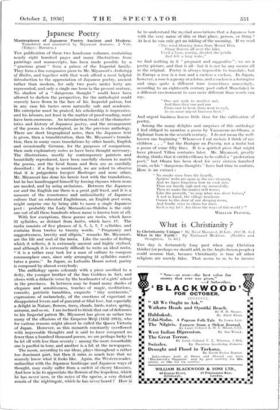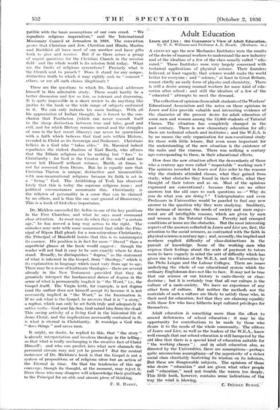What is Christianity ?
Is Christianity Unique ? By Nicol Msenicol, D.Litt. (S.C.M. Gs.) What is the Faith ? By Nathaniel Mieklem. (Hodder and Stoughton. 7s. 6d.) Tax day is fortunately long past when any Christian thinker (or perhaps we should add, in the Anglo-Saxon peoples) could assume that, because Christianity is true all other religions are merely false. That seems to us to be incom- patible with the basic assumptions of our own creed. " We repudiate religious imperialism," said the International Missionary Council at Jerusalem in 1928. The conviction grows that Christian and Jew, Christian and Hindu, Muslim and Buddhist all have need of one another and have gifts both to give and receive. But if so there arises a group of urgent questions for the Christian Church in the mission field--and the whole world is its mission field today. What are the limits of religious syncretism ? Precisely what is the Church Sent to preach ? Does it stand for any unique, distinctive truth to which it may rightly seek to " convert " others, or are all such claims illegitimate ?
These are the questions to which Dr. Macnicol addresses himself in this admirable study. There could hardly be a better discussion and few so fair, so tolerant and discerning. It is quite impossible in a short review to do anything like justice to the book or the wide range of subjects embraced in it. We can only indicate his main findings. With all his appreciation of Indian thought, he is forced to the con- clusion • that Pantheism (which can 'never commit itself to the sharp distinction between true and false, good and evil, and for which History remains unreal and the struggles of men in the last resort illusory) can never be syncretised with a faith which believes that God acts within History, revealed in Christ as its Sovereign and Redeemer. Christians believe in a God who " takes sides." Dr. Macnicol indeed repudiates the violent dualism of Karl Barth, who affirms that the Ethnic religions can be nothing but " foes " to Christianity : for God is the Creator of the world and has never left Himself without witness. Barth, at times, is not far removed from Deism. But he is equally sure that Christian Theism is unique, distinctive and inconvertible
ith non-incarnational religions because its faith is set in a " living " God. The Archbishop of York has observed lately that this is today the supreme religious .issue : and political circumstances accentuate this. Christianity is the religion of personality in a sense that can be claimed by no others, and is thus the one sure ground of Democracy. This is a book of first-class importance.
Dr. Micklem succeeded Dr. Selbie in one of the key positions in the Free Churches, and what he says must command close attention. As most men do when they reach " a certain age," he has moved a long way across to the right. The onlooker may note with some amusement that while the Prin- cipal of Ripon Hall pleads for a non-miraculous Christianity, the Principal of Mansfield insists that this is to misinterpret its essence. His position is in fact far more liberal " than a superficial glance at the book would suggest ; though the reader will not find it easy to be sure exactly where he does stand. Broadly, he distinguishes dogma," as the statement of what is inherent in the Gospel, from " theology," which is its explanation in language which must vary from age to age. There may be a score of legitimate theologies—there are several already in the New Testament—provided that they do genuinely interpret the fundamental datum of dogma in the sense of what is permanently implicit in " the Word," i.e., the Gospel itself. The Virgin birth, for example; is not dogma (and the author does not himself accept it) because it is not necessarily implied in " the Word," as the Incarnation is. If we ask what is the Gospel, lie answers that it is " a story," a mylhos, which can only be set forth truly and adequately in active verbs—God sent his Son, God raised him from the dead. This saving activity of a living God in the historical life of Jesus Christ, and the implications necessarily contained in it, is what is eternal in Christianity. It worships a God who " does things " and saves men.
It might, no doubt, be replied to this, that " the story " is already interpretation and involves theology in the telling ; so that what is really unchanging is the creative fact of Christ Himself ; and who can predict into what new channels the perennial stream may not yet be poured ? But the central insistence of Dr. Micklem's book is ,that the. Gospel is not a system of propositions or of religious ideas but an action of the Eternal in time. On that the tendencies -of ..this age converge, though its thought, at the moment, may reject it. Even those who may disagree will acknowledge theiy gratitude to the Principal for an able and sincere piece of thinking. , P. 11. Jitney.











































 Previous page
Previous page